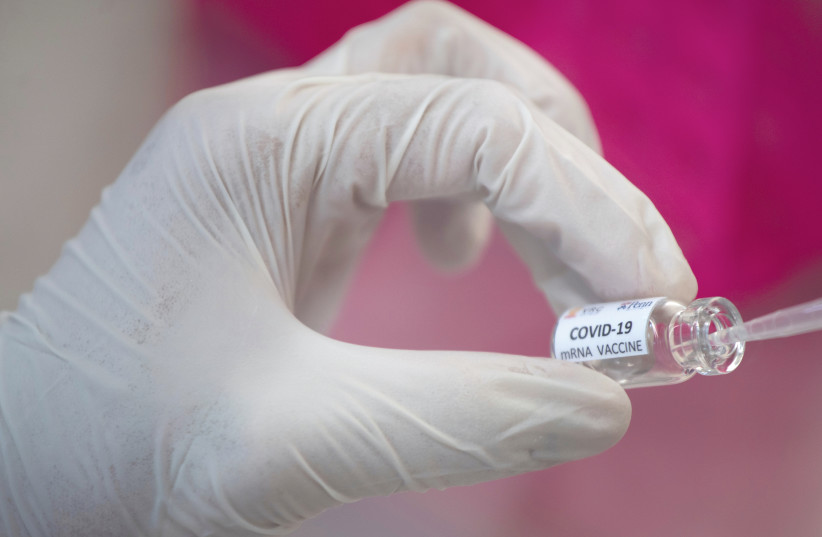The announcement by the Massachusetts-based Moderna pharmaceutical and biotechnology company on Sunday, that it is five to seven years away from unveiling a “groundbreaking set of new vaccines for a range of conditions including cancer, cardiovascular and autoimmune diseases” made headlines around the world.
The claimed “vaccines” are based on the success of the company’s mRNA (modified RNA) vaccine to protect against the COVID-19 vaccine. In fact, Moderna’s name combines the words “modified” and “RNA” and specializes in RNA therapeutics. The coronavirus vaccine, said the company, has so far produced in a year or a year and a half what would have taken 15 years to develop the cancer “vaccines” without it.
Company chief medical officer Dr. Paul Burton claimed such a breakthrough would be ready before 2030 or even by 2028 and save millions of lives around the world. “We will be able to offer personalized cancer vaccines against multiple different tumor types to people around the world," he was quoted as saying. Company officials said last month at a Boston healthcare conference that they were considering the possibility of asking the US Food and Drug Administration (FDA) for accelerated approval for its personalized cancer “vaccine.”
Is this truly a cancer vaccine?
But in an interview with The Jerusalem Post, Prof. Howard (Chaim) Cedar – a world-renowned expert in developmental biology and cancer research at the Hebrew University of Jerusalem’s department of developmental biology and cancer research and Israel Prize, Wol Prize, Rothschild Prize and EMET Prize winner – urged caution.
"Fighting cancer is like building a wall – not with bricks but little pebbles. Many researchers have been involved over the decades. It must be proven to work. I hope it will,” Cedar said.

But Cedar disputed Moderna’s term of “vaccine,” which has the connotation of preventing a disease, like its COVID-19 vaccine. “What the company described was not a preventive vaccine but immunotherapy that could treat diseases at an early stage.”
Messenger RNA is a molecule that contains the “recipe” or instructions to direct cells to create a protein using its natural machinery. Unlike traditional vaccines that introduced an attenuated (weakened or inactivated) virus or bacteria into the body, mRNA vaccines teach cells how to make a protein that triggers an immune response if someone gets infected. The COVID-10 vaccines of Moderna and Pfizer used mRNA instead of part of an actual bacteria or virus.
Its advantages are that they don’t demand nuclear localization or transcription (the process of making mRNA from DNA in the nucleus) and bear only a tiny possibility of genomic integration of the delivered sequence. The mRNA is produced in the nucleus using the nucleotide sequence of DNA as a template.
Using the immune system against cancer
One of the first to think of the idea of using the immune system to fight cancer, recalled Cedar, was the Austrian-born Prof. David Weiss, who made aliya from New York in 1966 and established the Lautenberg Center for General and Tumor Immunology, serving as its first director at the Hebrew University until 1996. “His father was the head of the school Rabbi Jacob Joseph (RJJ) Jewish day school, the first in the US, on the Lower East Side. My father was in one of the school’s first classes,” Cedar recalled. “David was a bit rebellious, enlisted in the US Marines, but then he returned to NY as religious and became an immunologist. He tried to use the immune system to fight cancer, but he didn’t succeed – as it was very complicated to get it to work. Since then, many others tried for 40 years, it couldn’t be used. Only in the last 15 and 20 years did people try again. The COVID-19 vaccines gave the work a big boost.”
As for the Coronavirus, it usually enters body, noted Cedar, “and the immune system recognizes it and produces antibodies. Moderna took the RNA of the virus and injected it. Then they injected RNA into the muscles and they made the protein. The immune system responds to that protein. But cancer is not a pathogen, and the mRA is not in a preventive vaccine but immunotherapy to treat malignancies. RNA itself is not dangerous. If scientists want to change it, this is much easier. Using mRNA to treat cancers would require working with something specific for each person’s type of cancer. If one used any other protein, the antibodies will not recognize it. The system is not tolerant to others.”
Burton was quoted as explaining: “First, doctors take a biopsy of a patient’s tumour and send it to a lab, where its genetic material is sequenced to identify mutations that aren’t present in healthy cells. I think we will have mRNA-based therapies for rare diseases that were previously undruggable, and I think that 10 years from now, we will be approaching a world where you truly can identify the genetic cause of a disease and, with relative simplicity, go and edit that out and repair it using mRNA-based technology.”
